Abstract
Software development projects differ in their sensitivity to losing developers. Some projects must stop already if they lose a few developers, while other projects can continue if the same number of developers leave the project. The TF quantifies these differences: It is the number of developers that would stop the project if they left the project. Multiple specific variants of the TF have been suggested in literature. This paper proves that some of these implementations are actually NP-hard to compute, including the promising worst-case metric TF min ,c . NP-hardness prevents their use for large software development projects. For the TF variants not proved to be NP-hard, this paper provides efficient algorithms. However, this paper argues that these TF variants have less explanatory power.
Access this chapter
Tax calculation will be finalised at checkout
Purchases are for personal use only
Preview
Unable to display preview. Download preview PDF.
References
Beck, K., Andres, C.: Extreme Programming Explained: Embrace Change, 2nd edn. Addison-Wesley Professional (2004)
Bowler, M.: Truck factor (May 2005), http://www.agileadvice.com/2005/05/15/agilemanagement/truck-factor/ (accessed September 25, 2014)
Goetgheluck, P.: Computing binomial coefficients. The American Mathematical Monthly 94(4), 360–365 (1987), http://www.jstor.org/stable/2323099
Karp, R.M.: Reducibility among combinatorial problems. In: Miller, R.E., Thatcher, J.W., Bohlinger, J.D. (eds.) Complexity of Computer Computations. The IBM Research Symposia Series, pp. 85–103. Springer US (1972), http://dx.doi.org/10.1007/978-1-4684-2001-2_9
Ricca, F., Marchetto, A., Torchiano, M.: On the difficulty of computing the truck factor. In: Caivano, D., Oivo, M., Baldassarre, M.T., Visaggio, G. (eds.) PROFES 2011. LNCS, vol. 6759, pp. 337–351. Springer, Heidelberg (2011), http://dx.doi.org/10.1007/978-3-642-21843-9_26
Zazworka, N., Stapel, K., Knauss, E., Shull, F., Basili, V.R., Schneider, K.: Are Developers Complying with the Process: An XP Study. In: Proceedings of the 2010 ACM-IEEE International Symposium on Empirical Software Engineering and Measurement, ESEM 2010, pp. 14:1–14:10. ACM, New York (2010), http://doi.acm.org/10.1145/1852786.1852805
Author information
Authors and Affiliations
Editor information
Editors and Affiliations
Rights and permissions
Copyright information
© 2014 Springer International Publishing Switzerland
About this paper
Cite this paper
Hannebauer, C., Gruhn, V. (2014). Algorithmic Complexity of the Truck Factor Calculation. In: Jedlitschka, A., Kuvaja, P., Kuhrmann, M., Männistö, T., Münch, J., Raatikainen, M. (eds) Product-Focused Software Process Improvement. PROFES 2014. Lecture Notes in Computer Science, vol 8892. Springer, Cham. https://doi.org/10.1007/978-3-319-13835-0_9
Download citation
DOI: https://doi.org/10.1007/978-3-319-13835-0_9
Publisher Name: Springer, Cham
Print ISBN: 978-3-319-13834-3
Online ISBN: 978-3-319-13835-0
eBook Packages: Computer ScienceComputer Science (R0)

